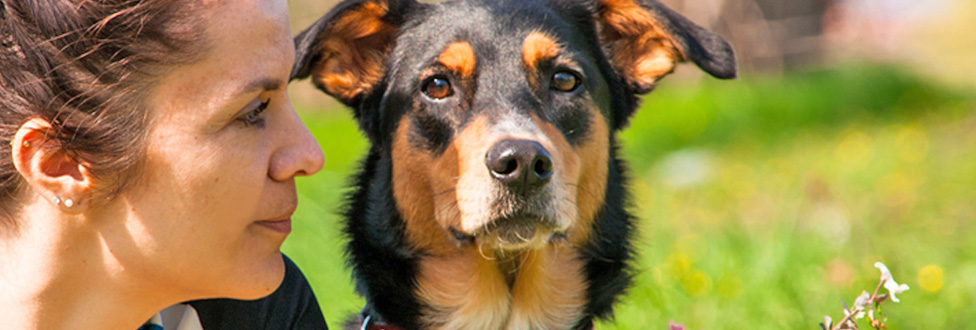ARL’s Pet Behavior Helpline Part II
Your Top 10 Questions During the COVID-19 Pandemic — Part II
The Animal Rescue League of Boston (ARL) is committed to keeping animals safe and healthy in their homes, and offers a free service to ensure that owners are providing the best care possible for the pets we love.
ARL’s Pet Behavior Helpline is a convenient and reliable resource for behavioral and health-related questions you may have regarding your pet.
We’re all spending more time at home during the COVID-19 outbreak, and over the past several weeks ARL has received a number of questions from concerned prospective or current pet owners.
We have answers from ARL’s Animal Behavior Manager Laney Nee for the top 10 questions, here’s the top 5!
Click here for the first half of the list!
Q: “Do dogs have a sense of time?”
A: Another great question!
Dogs do have a general sense of time based on the routine that you set forth in their life.
For example, my dachshund mix Maria knows when the clock is making its way towards 6 p.m. so between 5-6 p.m. she starts whining and is clingier towards myself or my husband.
We look at each other and say, ‘oh – it must be that time!’
This does not mean she looked at the clock and saw the exact time but she does knows that we both tend to be home during that time. She also knows our typical routine is that we feed her shortly after we come home from work each day.
Dogs also get a sense of time when we go through our typical daily routine as well.
They are constantly watching what we do when they’re with us so they know when it’s relaxation time, feeding time, time to play or go to bed!
Q: “Any suggestions for online puppy training?”
A: Our Free Pet Behavior Helpline is a great resource available and for the COVID-19 crisis we have three certified professional dog trainers available to speak with as well.
To find other resources online be sure to always look for resources promoting the use of positive reinforcement reward-based training methods.
Ensure that they do not utilize any correction training equipment such as choke chain, prong, vibration or electronic type collars for training.
Q: “How do I make sure my puppy who is not yet crate trained is safe at home while I’m working?”
A: Contact our Free Pet Behavior Helpline and set up an appointment with one of our three certified professional dog trainers to review how to properly crate train your puppy.
Use this social distancing time to practice training so that by the time you return back to your daily routine, your dog will more comfortable spending time alone in his crate.
Q: “How can I make bath time more tolerable for my pup?”
A: In one word — food!
Always pair delicious treats when your pup is experiencing something new, like a bath.
If you have two people available to help during bath time, bring out your training treats, and have one person feed your dog while the other continues with bathing.
If your dog stops eating, then bring out higher-value food such as cheese or boiled chicken. Continue to offer your dog food throughout the entire bath.
If you’re giving the bath solo, you can smear peanut butter or cream cheese on a suction feeding mat toy and as your dog is happily licking, bathe away!
Q: “Do you offer dog socialize classes? I recently adopted a 1-and-a-half-year-old and want her to socialize.”
A: We offer group dog training classes that include 5-8 dogs with their pet parents.
We also offer on-site private lessons where we will work on any and all training and behavioral issues.
Please note: ARL’s dog training courses are currently suspended until after May 1.
Socializing your new dog will also happen organically as you start bringing your pup through their daily routine of walks and playtime.
Because your dog is new to you and your environment, it’s important to expose your dog to new things slowly and at your dog’s own pace. Pair new experiences with delicious treats to help build a positive association to the new experience.
If your adopted dog came up from a southern state, Puerto Rico, or another Caribbean island, it is important to remember the environment that your dog spent the first year of his life in. Your dog likely spent most of his time off leash and free to come and go as he pleased, especially if he was found as a stray. He most likely was able to run from things he was afraid of and had limited interaction with people.
As your dog transitions to a life in New England, it’s important to maintain patience as your dog acclimates to his new environment and routine.
Walking on a leash means that your dog no longer has the option to flee from unwanted situations and can result in your dog exhibiting fearful behavior towards new things. It’s important to get him acclimated to his leash and collar before you head outdoors, start with short walks and don’t forget to bring treats!
Simply adding high value treats to the equation can completely change the experience for your dog and eventually he will acclimate to his new life.
ARL FREE Pet Behavior Helpline
ARL’s Pet Behavior Helpline is a FREE service, and can answer basic behavioral questions about your pet, such as excessive barking, crate training, house soiling, or if you are looking for ways to stave off your pet’s boredom.
If you have questions, please call the Pet Behavior Helpline at (617) 226-5666 or via email behaviorhelpline@arlboston.org and an ARL representative will get back to you within 48 hours.

